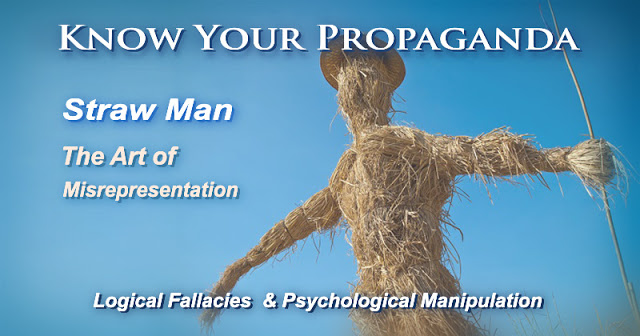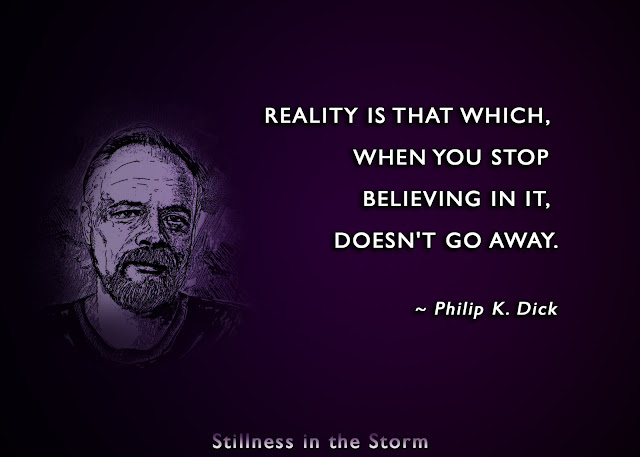Know Your Propaganda – Straw Man – The Art of Misrepresentation

(Stillness in the Storm Editor) In the following article, Shem from Discerning The Mystery offers some great insight about the straw man fallacy. While this might seem like some obscure academic reference, I can assure you that almost everyone succumbs to this kind of thinking from time to time. Briefly, raw information combined with interpretation produces a subjective experience of any data set—the automatic aspect of our philosophic nature. Facts or information alone are devoid of meaning, but when a fact or data point enters the field of our awareness, the automatic aspects of consciousness (the subconscious and superconscious) go to work. This "personalizes" the fact, producing emotions, insights, and inferences. For example, a batch of cookies baking in the oven often produces good feelings, and a desire to eat them. The smell of the cookie itself is the raw data, the fact, which is interpreted subjectively to produce secondary sensations that we normally associate with that smell. What this means is that our subjective experience acts as an intermediary between objective reality and what we perceive. We make decisions and choices from our subjective experience, not reality directly. As such, ensuring our perceptions, interpretations, and conclusions are accurate is incredibly important. In most instances, confrontations about ideas is not specific to the fact itself, it's focused on our inferences of the objective fact. We tend to confuse our interpretations with reality itself, which can lead to unproductive conversation if we aren't humble and thinking critically.
“Reality is that which, when you stop believing in it, doesn't go away.”
So what does this have to do with straw man fallacies and propaganda?― Philip K. Dick, I Hope I Shall Arrive Soon
As Shem reveals below, one of the tactics of our would-be masters is to make communication between people difficult, which prevents us from sharing truth amongst ourselves for collective upliftement.
The term describing this miscommunication is called complementary schismogenesis, coined by Gregory Bateson.
In other words, the current state of human consciousness provides plenty of fertile ground for miscommunication. The powers that be know this, and by consciously misrepresenting a person in an argument, debate, or exchange, they can paint someone as crazy or idiotic. Onlookers are the target, as the impression of idiocy makes them believe what someone is saying shouldn't be believed.Bateson observed that when people speak the same language, unless there is a good level of communication rapport present between them, two people, or more, will exchange statements, and misunderstand each other. Then, as an individual feels they weren't properly heard, they will speak to the misinterpretation, often causing even further confusion. Simply put, two people could be talking about the same thing, all while thinking they are disagreeing with each other. Take a moment to consider how often this happens in your own life.
This language barrier is exacerbated by intolerance and emotionally charged exchanges—when people refuse to hear people out, and react to what they think another person said.
The high-paced nature of modern life, and a slow degradation of philosophic skills in the population, creates a condition where individuals can become heavily image trained, or rigidly focused on one set of terms or rhetoric to describe their field of interest. Add a healthy mix of prejudicial bias at an ideological level, and when discussion finally begins, likely the only result will be lack of discourse or a mutually beneficial exchange of ideas.
In other words, people in all walks of life, have forgotten how to share ideas and be respectful with others, to listen honestly, and develop social graces that allow for misunderstandings to be clarified. Non-confrontational communication methods are desperately needed, everywhere in society. (source)
This happens frequently on news services like CNN, MSNBC, or Fox News. Either a newscaster or a guest will misinterpret what the other is saying, and respond to their incorrect interpretation, instead of gaining clarity.
Consider the following example, where Bill Nye persistently misinterprets Tucker Carlson in the following Fox News clip.
https://youtu.be/qN5L2q6hfWo
Notice how Carlson's simple question was persistently cast as stupid or idiotic? This tactic works well for those who are dogmatically pro-man-made climate change. But generally speaking, people who believe something, without knowing why (lacking epistemic comprehension—failing to do their mental homework), tend to have close-minded reactions to opposing ideas. They react with aggression to defend their personal dogma, instead of asking honest questions to better understand the new information.
Clearly, if we're honest truth seekers, we want to avoid dogma. We want to embrace new ideas from others instead of rejecting them.
Propaganda through the straw man fallacy is essentially the intentional use of misinterpretation to confuse an audience of onlookers so that one person—and by extension, their ideas—are made to look crazy or insane.
By looking at media, academia, and how people share ideas and concepts in general, it should become clear just how much miscommunication is happening. So as individuals, we should strive to clarify our interpretations as much as possible.
The insidious ones out there use this potential for misunderstanding to their advantage, making honest people look crazy. But we who strive to be honest and truthful, shouldn't make the mistake of reacting to our misinterpretations.
Non-violent communication is one founded on respect of the other person and humility with respect to ourselves. We shouldn't assume we automatically know exactly what someone else is saying, we should clarify: "Thanks for sharing that idea. It sounded like you were saying X, Y, Z. Am I right? Am I hearing you correctly?"
This method is incredibly effective as it establishes mutual respect and rapport. It helps build better relationships with others, so we don't accidentally argue over things we misunderstood. And it makes other people feel like you're genuinely interested in what they have to say, as opposed to just waiting for them to stop speaking so you can pound your opinion into their head.
Related Psychology of Truth Sharing and Awakening Others with a Personal Anecdote | Now That You’ve Awakened How Do You Awaken Others?
And finally, asking for clarification helps reveal a less than ethical person in your midst.
Someone who isn't interested in sharing ideas, and is instead interested in making you look foolish, will shy away from a request for clarity. They'll take the chance to make fun of you for not understanding them automatically or they'll attack you with insults. Either way, you can get a good impression of what someone's true intentions are by humbly asking a question of clarification.
I hope you'll take the time to learn from what Shem has to offer below and use these non-violent communication methods in your own life.
Related Discernment 101 | Intrinsic and Extrinsic Knowledge -- Critical Thinking Fundamentals: Correlation and Causation
These skills can help your relationships with loved ones and friends, as well as helping you deal with people who are more interested in antagonism than honest cooperation. So long as you remain humble and align yourself with the truth, the lack of integrity in others will be easy to see and deal with.
- Justin
Source - Discerning The Mystery
by Shem El Jamal, September 15th, 2017
Have you ever listened to a debate where one person begins to argue against a point the other person never made? This may sound like a strange situation, but it is actually typical within the bounds of what may be considered the dark side of debate.
When we refer to a 'logical fallacy,' we are referring to logical flaws used by either those who are intellectually unaware or those who are deliberately deceptive toward the unaware. These fallacies are typically used to deceive the unawakened audience. On a larger scale they are regularly used by the Cabal and their media apparatus to psychologically manipulate the thoughts and opinions of the world's population to maintain global control.
Related post: Tips on Discernment – Discerning the Self – Discussing the Vital Lesson of Self-Evaluation
The specific fallacy we are discussing here is known as the Straw Man tactic. This fallacy can be a particularly deceptive tactic in that it is not as blatant as other fallacies, but before getting into detail, let's get some definition on the subject.
Straw Man
Description: Substituting a person’s actual position or argument with a distorted, exaggerated, or misrepresented version of the position of the argument.
Logical Form:
Person 1 makes claim Y.
Person 2 restates person 1’s claim (in a distorted way).
Person 2 attacks the distorted version of the claim.
Therefore, claim Y is false.
Example #1:
Ted: Biological evolution is both a theory and a fact.
Edwin: That is ridiculous! How can you possibly be absolutely certain that we evolved from pond scum!
Ted: Actually that is a gross misrepresentation of my assertion. I never claimed we evolved from pond scum. Unlike math and logic, science is based on empirical evidence and, therefore, a scientific fact is something that is confirmed to such a degree that it would be perverse to withhold provisional consent. The empirical evidence for the fact that biological evolution does occur falls into this category.
Explanation: Edwin has ignorantly mischaracterized the argument by a) assuming we evolved from pond scum (whatever that is exactly), and b) assuming “fact” means “certainty”.
Example #2:
Zebedee: What is your view on the Christian God?
Mike: I don’t believe in any gods, including the Christian one.
Zebedee: So you think that we are here by accident, and all this design in nature is pure chance, and the universe just created itself?
Mike: You got all that from me stating that I just don’t believe in any gods?
CONTINUE READING @ discerningthemystery2000plus.blogspot.comExplanation: Mike made one claim: that he does not believe in any gods. From that, we can deduce a few things, like he is not a theist, he is not a practicing Christian, Catholic, Jew, or a member of any other religion that requires the belief in a god, but we cannot deduce that he believes we are all here by accident, nature is chance, and the universe created itself. Mike might have no beliefs about these things whatsoever. Perhaps he distinguishes between “accident” and natural selection, perhaps he thinks the concept of design is something we model after the universe, perhaps he has some detailed explanation based on known physics as to how the universe might have first appeared, or perhaps he believes in some other supernatural explanation. Regardless, this was a gross mischaracterization of Mike’s argument.
Exception: At times, an opponent might not want to expand on the implications of his or her position, so making assumptions might be the only way to get the opponent to point out that your interpretation is not accurate, then they will be forced to clarify.
https://www.logicallyfallacious.com/tools/lp/Bo/LogicalFallacies/169/Straw Man-Fallacy

Partial Image Credit NCMallory
Thanks to Justin at: http://www.stillnessinthestorm.com






 Sat Mar 23, 2024 11:33 pm by globalturbo
Sat Mar 23, 2024 11:33 pm by globalturbo

